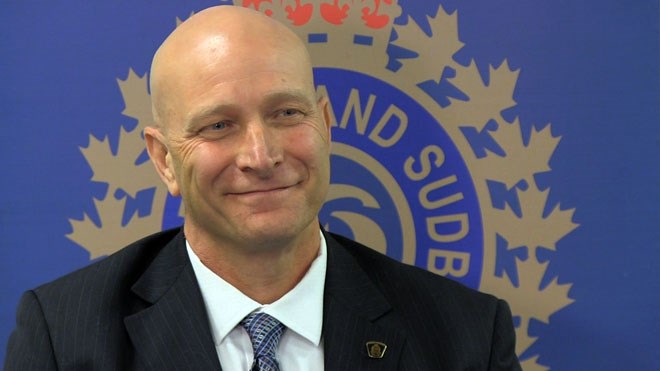The complexities of modern police work are a major factor behind soaring policing costs, says Greater Sudbury Police Chief Paul Pedersen.
Speaking at a Greater Sudbury Chamber of Commerce luncheon Wednesday, Pedersen gave the example of dealing with domestic disputes, of which there were 2,100 incidents in the city last year.
At one time, each call took about an hour to deal with. Police would talk to the husband and wife and calm them down, have them promise to behave, and they would be out the door.
That was wrong, Pedersen, said, and attitudes towards domestic violence have evolved and police approach such calls much differently today. While that's a positive thing, it also means each call takes an average of 12 hours to deal with.
"Quite candidly, we were responding improperly and dealing with it improperly,” he said. “It is criminal behaviour."
But the improved response also costs significantly more in police time, and is an example of why police budgets are increasing even as crime rates drop.
That model holds true for other types of crime, Pedersen said. The time it takes to investigate a break and enter has increased by 58 per cent in the last several years; the time it takes to investigate DUIs is up by 250 per cent.
And out of the 60,000 calls police receive from the public last year, only 15 per cent were related to criminal activity, but police are still expected to respond.
"We end up being the emergency responder of choice for so much,” he said. “We are asked over and over to deal with traffic issues, not crime. We're asked to deal with youth loitering issues, to deal with drinking complaints, noise complaints, mental-health calls.
“And I often say if not us, then who? Who, at three o'clock in the morning, are you going to call if your snowbanks are too high? If your neighbour is making too much noise? Or if someone with a mental illness is acting out?"
He talked about a recent news release from the Ministry of Natural Resources that advised people they could call the MNR if there was a problem with nuisance coyotes -- or they could call police.
"So we're coyote catchers, too," he said. "I can tell you our job is significantly more complex than it ever, ever, ever has been ... With that complexity comes an increased workload, it comes with increased expectations."
Police are also committed to community outreach programs, such as working with youths in the schools and with neighbourhood association as part of their efforts to address potential problems before an offence is committed.
All of which adds up to a huge strain on police budgets, not just in Sudbury but across Canada, Pedersen said.
"It's one thing to struggle with it, it's another thing to deal with it,” he said. “And that's where I hope to take us."
To that end, Pedersen has introduced the idea of hiring community safety officers, people who would handle certain tasks frontline officers are handling now, but don't need to be.
"We're looking at that as a cost-effective way to continue to deliver the quality of service that our community expects in the most effective way possible while still being efficient," he said. "If you don't need a gun, and you don't need a Taser, and you don't need pepper spray to do the job, do you need to be a police officer?"
They would take the lead, for example, in providing education to seniors groups, youth groups, taking incident reports -- situations where there's no chance that use of force will be required or search warrants will be handed out.
To that end, this year's $52.5-million police budget includes plans to hire eight community police officers, instead of filling six vacancies with full-time police officers.
Join Sudbury.com+
- Messages
- Post a Listing
- Your Listings
- Your Profile
- Your Subscriptions
- Your Likes
- Your Business
- Support Local News
- Payment History
Sudbury.com+ members
Already a +member?
Not a +member?
Sign up for a Sudbury.com+ account for instant access to upcoming contests, local offers, auctions and so much more.
